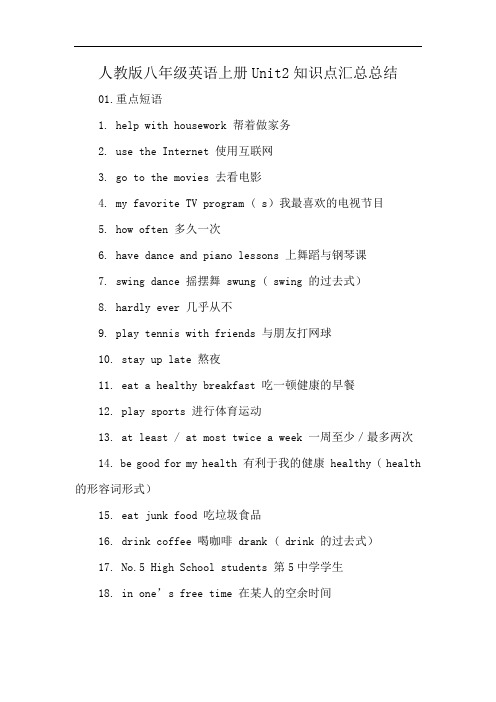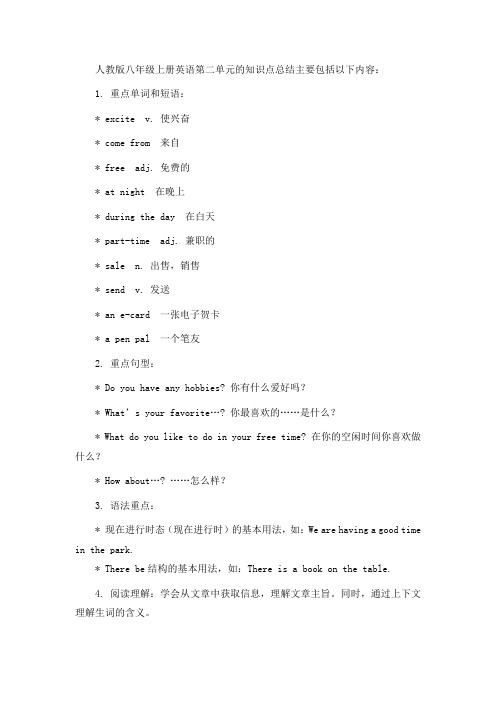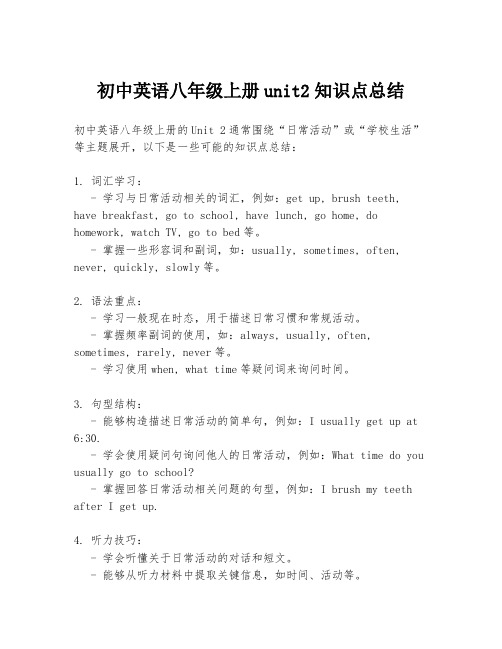八年级上册英语第二单元知识点梳理
人教版八年级英语上册Unit2知识点汇总总结

人教版八年级英语上册Unit2知识点汇总总结01.重点短语1. help with housework 帮着做家务2. use the Internet 使用互联网3. go to the movies 去看电影4. my favorite TV program ( s)我最喜欢的电视节目5. how often 多久一次6. have dance and piano lessons 上舞蹈与钢琴课7. swing dance 摇摆舞 swung ( swing 的过去式)8. hardly ever 几乎从不9. play tennis with friends 与朋友打网球10. stay up late 熬夜11. eat a healthy breakfast 吃一顿健康的早餐12. play sports 进行体育运动13. at least / at most twice a week 一周至少/最多两次14. be good for my health 有利于我的健康 healthy ( health 的形容词形式)15. eat junk food 吃垃圾食品16. drink coffee 喝咖啡 drank ( drink 的过去式)17. No.5 High School students 第5中学学生18. in one’s free time 在某人的空余时间19. ask them about their free time activities 询问他们关于他们的业余活动20. not … at all 根本不…21. go online 上网22. be surprised that ..感到惊讶23. use it for fun 为了取乐而使用它24. the answers to the questions 这些问题的答案25. one to three times a week 一周一到三次26. two percent of the students 2%的学生27. the best way to do sth.做某事的最好方式28. such as 例如29. spend time with your friends 与你的朋友共度时光spent ( spend 的过去式)30. spend time on sth./ in doing sth.花时间在某事上/做某事31. play together 一起玩32. watch TV for over 2 hours 看两个多小时电视33. go to the dentist 去看牙医34. a 16-year-old high school student 一名16岁的中学生35. have a lot of good habits 有许多好习惯36. more / less than two hours 多/少于两小时37. go to the dentist for teeth cleaning 去牙医处清洁牙齿38. go to the shopping center 去购物中心02.重点句子语法聚焦1. --What do you usually do on weekends?你在周末通常做什么?--I always exercise.我总是锻炼。
人教版八年级上册英语第二单元知识点总结

人教版八年级上册英语第二单元的知识点总结主要包括以下内容:1. 重点单词和短语:* excite v. 使兴奋* come from 来自* free adj. 免费的* at night 在晚上* during the day 在白天* part-time adj. 兼职的* sale n. 出售,销售* send v. 发送* an e-card 一张电子贺卡* a pen pal 一个笔友2. 重点句型:* Do you have any hobbies? 你有什么爱好吗?* What’s your favorite…? 你最喜欢的……是什么?* What do you like to do in your free time? 在你的空闲时间你喜欢做什么?* How about…? ……怎么样?3. 语法重点:* 现在进行时态(现在进行时)的基本用法,如:We are having a good time in the park.* There be结构的基本用法,如:There is a book on the table.4. 阅读理解:学会从文章中获取信息,理解文章主旨。
同时,通过上下文理解生词的含义。
5. 写作练习:学会描述自己的爱好、空闲时间活动等,可以通过写日记、邮件等方式进行练习。
6. 听力训练:通过听力材料,提高听力和理解能力,同时学习常用的日常交际用语。
7. 口语练习:通过角色扮演、小组讨论等方式,练习口语表达和交流能力。
8. 文化背景知识:了解不同国家的文化背景和习惯用语,提高跨文化交际能力。
以上是第二单元的主要知识点总结,学生需要重点掌握并熟练运用。
同时,通过大量的阅读、写作、听力和口语练习,提高英语综合运用能力。
八年级上册英语unit2知识点整理

八年级上册英语unit2知识点整理(经典版)编制人:__________________审核人:__________________审批人:__________________编制单位:__________________编制时间:____年____月____日序言下载提示:该文档是本店铺精心编制而成的,希望大家下载后,能够帮助大家解决实际问题。
文档下载后可定制修改,请根据实际需要进行调整和使用,谢谢!并且,本店铺为大家提供各种类型的经典范文,如演讲稿、总结报告、合同协议、方案大全、工作计划、学习计划、条据书信、致辞讲话、教学资料、作文大全、其他范文等等,想了解不同范文格式和写法,敬请关注!Download tips: This document is carefully compiled by this editor. I hope that after you download it, it can help you solve practical problems. The document can be customized and modified after downloading, please adjust and use it according to actual needs, thank you!In addition, this shop provides you with various types of classic sample essays, such as speech drafts, summary reports, contract agreements, project plans, work plans, study plans, letter letters, speeches, teaching materials, essays, other sample essays, etc. Want to know the format and writing of different sample essays, so stay tuned!八年级上册英语unit2知识点整理把学问过于用作装饰是虚假;完全依学问上的规则而断事是书生的怪癖。
初中英语八年级上册unit2知识点总结

初中英语八年级上册unit2知识点总结初中英语八年级上册的Unit 2通常围绕“日常活动”或“学校生活”等主题展开,以下是一些可能的知识点总结:1. 词汇学习:- 学习与日常活动相关的词汇,例如:get up, brush teeth, have breakfast, go to school, have lunch, go home, do homework, watch TV, go to bed等。
- 掌握一些形容词和副词,如:usually, sometimes, often, never, quickly, slowly等。
2. 语法重点:- 学习一般现在时态,用于描述日常习惯和常规活动。
- 掌握频率副词的使用,如:always, usually, often, sometimes, rarely, never等。
- 学习使用when, what time等疑问词来询问时间。
3. 句型结构:- 能够构造描述日常活动的简单句,例如:I usually get up at 6:30.- 学会使用疑问句询问他人的日常活动,例如:What time do you usually go to school?- 掌握回答日常活动相关问题的句型,例如:I brush my teeth after I get up.4. 听力技巧:- 学会听懂关于日常活动的对话和短文。
- 能够从听力材料中提取关键信息,如时间、活动等。
5. 口语表达:- 能够用英语描述自己的日常活动。
- 学会在对话中询问和回答关于日常活动的问题。
6. 阅读理解:- 阅读有关日常活动的文章或故事,理解大意和细节。
- 学会从阅读材料中找出关键信息,并回答相关问题。
7. 写作技巧:- 学会写关于自己或他人日常活动的短文。
- 使用正确的时态和句型结构来描述活动。
8. 文化意识:- 了解不同文化背景下人们的日常生活差异。
- 学会尊重和欣赏不同的生活方式和习惯。
初中英语人教版八年级上册第二单元知识点

初中英语人教版八年级上册第二单元知识点Unit 2 How often do you exercise?n A1.How often do you exercise?how often对做某事的次数/频率进行提问,常用表示频率的词进行回答,如:always。
usually。
often。
sometimes等。
2.表示频率的短语次数+一段时间“多久一次”次数为三次及以上:“基数词+times”如:once a day。
twice a week。
three times a month。
3.Hi,Clair。
are you free next week?sb be free= sb have time某人有空Are you free?=Do you have time?XXX某物是免费的XXX.糊口中最好的工具是免费的。
4.Hmm。
next week is quite full for me.be quite full for sb=be quite busy for sb某人很忙5.She said it’s good for my health.health (n.)安康---XXX(adj.)安康的XXXBe in good health=healthy身材安康Grammar focus1不安康的6.How often的用法how often用来对透露表现做某事的频次举行发问,回覆时能够用透露表现频次副词或透露表现频次的短语举行回覆。
如:How often do you go shopping?1)---Ioftengo shopping。
(频次副词回覆)2)---I go shopping twice a week。
(频次短语回覆)2.频次副词位置:be之后,动之前。
(be动词之后,Shiite动词之前)频率词及发生概率大小(由大到小):Always。
usually。
often。
sometimes。
八上英语第二单元知识点

以下是八年级上册英语第二单元的一些重要知识点:1.动词不定式:不定式是一种非限定动词,它可以表示未来的动作或状态,也可以表示希望、要求或可能性。
例如,“to go”、“tobe”、“to have”。
2.情态动词:情态动词是一种表达情态的动词,它们表示可能性、愿望、建议等。
例如,“can”、“could”、“may”、“might”。
3.连系动词:连系动词是一种表示状态或关系的动词,它们连接主语和表语。
例如,“be”、“seem”、“look”。
4.行为动词:行为动词表示具体的动作或行为。
例如,“run”、“jump”、“write”。
5.助动词:助动词是一种帮助主要动词表达意思的动词。
例如,“do”、“does”、“did”。
6.实义动词:实义动词表示具体的意义或动作。
例如,“eat”、“drink”、“sleep”。
7.短语动词:短语动词是由一个动词和一个或多个副词构成的短语。
例如,“look at”、“listen to”、“talk to”。
8.祈使句:祈使句是一种命令或请求的句子。
例如,“Go to the door!”、“Don't do that!”。
9.疑问句:疑问句是一种提出问题的句子。
例如,“Are you ready?”、“What time is it?”。
10.陈述句:陈述句是一种陈述事实或表达意见的句子。
例如,“It's a beautiful day.”、“I like to read books.”。
以上是八年级上册英语第二单元的一些重要知识点,希望能对你有所帮助。
八年级上册英语unit2知识点总结
八年级上册英语unit2知识点总结Unit2是八年级英语的重要单元之一,本单元主要内容为“Where’s the post office?”。
本文将围绕该单元的主题,总结出重点知识点,以供学习参考。
一、句型1. Where is …? 该句型是询问某个地方的位置,“where”在句子中表示“哪里”,后面加上要询问的地方,例如“Where is the post office?”2. It’s on/at 表示某个地方的位置,其中“on”表示位置在表面上(例如在桌子上),而“at”则表示位置在某个小区域或大楼里(例如在邮箱处)。
例如:The post office is on the corner of Main Street and High Street. The mailbox is at the entrance of the supermarket.3. How far is it from here? 该句型是询问某个地方离这个地方有多远,例如“How far is it from here to the post office?”4. It’s about/around … miles/km. 该句型是回答上面提到的问题,其中“about/around”表示大约,“miles/km”表示距离,例如“It’s about two miles from here to the post office.”5. Go straight ahead. 该句型表示向前直走。
另外,“turn left”, “turn right”分别表示向左转、“向右转。
”6. How can I get to …? 该句型是询问如何到达某个地方,例如“How can I get to the post office?”7. You can take the bus/…/go straight ahead. 该句型是回答上面提到的问题,其中“take the bus/…/go straight ahead”表示到达某个地方的方法,例如“You can take the bus No.7 or go straight ahead for two blocks.”二、单词词汇1. Post office 邮局2. Mailbox 邮箱3. Supermarket 超市4. Bank 银行5. Hospital 医院6. Cinema 电影院7. Museum 博物馆8. Bookstore 书店9. Library 图书馆三、语法1. 介词的用法介词是连接名词或代词和其他词的词。
八年级上册英语unit2知识点归纳人教版
八年级上册英语unit2知识点归纳人教版八年级上册英语Unit 2知识点归纳Unit 2的主要内容是关于家庭和朋友的,本文将对这个单元的知识点进行归纳总结。
一、家庭成员1.家人的称呼① father 父亲② mother 母亲③ parents 双亲(父母)④ grandfather 爷爷⑤ grandmother 奶奶⑥ grandparents 祖父母(外公外婆或者爷爷奶奶)⑦ son 儿子⑧ daughter 女儿⑨ children 孩子⑩ elder brother 哥哥⑪ younger brother 弟弟⑫ elder sister 姐姐⑬ younger sister 妹妹2.家庭成员的职业father:teacher, doctor, businessman, worker…mother:nurse, musician, artist, housewife…grandfather / grandmother:retired, farmer, scientist, writer…brother / sister:student, athlete, musician, artist, …二、家务1.厨房用具① microwave 微波炉② refrigerator 冰箱③ stove 火炉④ oven 烤箱⑤ blender 搅拌器⑥ toaster 烤面包机⑦ kettle 水壶2.家务动词① cook 做饭② wash the dishes 洗碗③ sweep 扫地④ mop 拖地⑤ clean the bathroom 打扫浴室⑥ make the bed 整理床铺⑦ do the laundry 洗衣服三、朋友1.朋友类型① best friend 最好的朋友② close friend 亲密的朋友③ new friend 新朋友④ childhood friend 童年时的朋友⑤ schoolmate 同学2.谈论朋友的习惯和特点① He / She is always there for me. 他 / 她总是在我身边。
八年级上册第二单元sectiona知识点
八年级上册第二单元sectiona知识点八年级上册第二单元Section A知识点本文将介绍八年级上册第二单元Section A中的重要知识点。
这些知识点是学生们理解本单元内容的关键,对于提高学生英语语言能力和应试能力具有重要的意义。
一、情态动词“should”情态动词“should”表示建议或建议应该怎么做。
例如,“你应该多读书。
”在这个句子中,“should”表示建议或建议。
当我们用“should”对他人建议时,通常说“you should”,而当我们对自己要求更高时,通常说“I should”。
二、“why” 用于提出问题或询问原因“why”常用于提出问题,询问原因,例如:“为什么你没有来上课?”在这个句子中,“why”用于询问原因。
“why”还可以用于构建引导疑问句的词组,如“why not”,用于询问某人为什么不做某事,如“为什么不去看电影呢?”在这个句子中,“why not”用于询问为什么不去看电影。
三、“so do I”和“neither do I”用于表达同意和不同意“so do I”和“neither do I”常用于表达同意或不同意,例如:“我喜欢游泳。
”“我也喜欢游泳。
”在这个句子中,“so do I”用于表达同意。
以及,“我不喜欢吃蔬菜。
”“我也不喜欢吃蔬菜。
”在这个句子中,“neither do I”用于表达这种意见上的共鸣。
四、“might”表示“可能”、“也许”“might”是一个情态动词,表示“可能”、“也许”,例如,“我今晚可能去看电影。
”在这个句子中,“might”用于表示可能性。
除此之外,“might”还可以表示建议的婉转说法,例如:“你也许应该考虑一下早点睡觉。
”五、动词不定式作主语动词不定式是一个动词的主格形式,在句子中可以作为主语,例如:“唱歌是我的爱好。
”在这个句子中,“唱歌”就是动词不定式作为主语。
动词不定式还可以和情态动词一起使用,如“我应该去跑步。
人教版英语 八上第二单元知识点
八年级上册第二单元一、单词hardly adv.几乎不,几乎没有hard adj.坚硬的、坚固的、困难的、努力的、冷酷无情的、硬心肠的、苛刻的、寒冷的、凛冽的full adj.忙的,满的,充满的,饱的-反义词hungry饥饿maybe 大概也许可能may beat least 至少at most最多health 健康;人的身体状态-healthy健康的online adj.在线的,联网的--反义词offline断网的,下线的although =though虽然、尽管、即使mind n.头脑、心智brain n.脑、大脑head n.头;头脑;脑筋(包括brain and mind)such as 例如,像....一样for example 例如,譬如die v.死亡、消失、消亡dead adj.死的、失去生命的、枯萎的death n.死、死亡;生命的状态终止、死亡状态;死神writer n.作者、作家write v.书写、写作、作曲、编写more than 多于;超过less than少于point n.得分、点;v.指、指向二、词组on weekends =at/on the weekend 在周末go to the movies去看电影help with housework帮忙做家务read a book/books/English book 看书/看英语书watch TV 看电视go shopping =do some shopping去购物use the internet 使用互联网、使用网络use of the internet网络的使用be free 有空,空闲swing dance 摇摆舞,爵士舞的一种next week下周be full 忙碌、有很多活动;饱的how come?为什么?怎么会?(奇怪)have dance lessonhow about =what about……怎么样?……呢play tennis with friendsdrink milk 喝牛奶stay up (late)eat a healthy breakfast/lunch/dinner吃一顿健康的早餐/午餐/晚餐play sports做运动go to bed early早睡、睡得早best friend(s) 最好的朋友(们)the best friend最好的朋友after school放学后be good for sb./sth.对……有好处,有用be good to sb.对……好be good at擅长做某事;精通某事;熟练be good with sb./sth.灵巧的、精明的、善于应付的good habits好习惯bad habits 坏习惯last month上个月ask:询问ask sb about sth询问某人关于某事ask about询问ask sth提问、询问ask :要求、请求ask sb to do sth请求、要求某人去做某人ask (sb) for sth向(某人)征求、请求、恳求(给予)ask to do 请求允许去做某事find that (从句)four to six 四到六not at all一点也不(to) go online 上网the other另外的at least 至少at most最多for fun 乐趣有趣the answer to ……的答案question(s) about ……关于……的问题although though 不能与but连用the most popular 最受欢迎的the best way to do sth is 做某事最好的方式the best way to relax is放松最好的方式是spend time with your friends和朋友一起(度过时光)play together一起玩draw pictures画画go to the dentist去看牙医a lot of =lots of =a number of大量许多a lot of +可数/不可数a number of +可数名词的复数teeth cleaning牙齿清洁三、知识点1、频率的表达every dayonce (次数) a month (时间段)一月一次twice a week 一周两次three times a week一周三次2、倍数的表达once、twice、three times、four times 3、百分比的表达基数词+percent20 percent四、句型How often do you+做某事?你多久……How often dose she+做某事?她多久……What’s your favorite programme?你最喜欢的节目是什么?What kind of ?哪种……It’s adj to do sth.做某事是……It’s adj for sb to do sth.对某人来说做某事是……It’s good to relax.It’s healthy for the mind and the body. Old habits die hard.本性难移。
- 1、下载文档前请自行甄别文档内容的完整性,平台不提供额外的编辑、内容补充、找答案等附加服务。
- 2、"仅部分预览"的文档,不可在线预览部分如存在完整性等问题,可反馈申请退款(可完整预览的文档不适用该条件!)。
- 3、如文档侵犯您的权益,请联系客服反馈,我们会尽快为您处理(人工客服工作时间:9:00-18:30)。
1 / 8 八年级上册英语第二单元知识点梳理 How often do you exercise? 【应掌握的词组】 1、help with housework 帮助做家务活 2、go shopping 购物, 3、on weekends 在周末, 4、how often 多久一次 5、hardly ever几乎不, 6、once a week 每周一次 7、twice a month每月二次, 8、go to the movies去看电影 9、every day 每天, 0、use the Internet上网/用网 1、be free有空, 2、have dance and piano lessons 上舞蹈钢琴课 , 3、swing dance摇摆舞 4、play tennis 打网球, 5、stay up late熬夜, 6、at least至少, 7、go to bed early 早睡, 8、 play sports 锻炼身体, 2 / 8
9、be good for 对…有好处, 0、go camping去野营, 1、in one’s free time 在某人的空闲时间 2、not….at all 根本不, 3、the most popular 最流行, 4、such as例如, 5、go to the dentist去看牙医, 6、more than 超过/多于, 7、Old habits die hard.旧习惯难改 8、 hard=difficult 困难的 , 9、less than 少于/不到反义词为more than多于 30. help sb. with sth 帮助某人做某事 help sb do/ to do sth 帮助某人做某事
31. How about…? =What about…? ….怎么样?/ ….好不好? What about doing sth?做某事怎么样? 32. want sb. to do sth. 想让某人做某事 33. How many + 可数名词复数+ 一般疑问句 ….有多少….. 34. 主语+ find+ that 从句 …发现… 35. It’s + adj.+ to do sth. 做某事是….的 36. spend time with sb. 和某人一起度过时光 37. ask sb. about sth. 向某人询问某事 3 / 8
38. by doing sth. 通过做某事 39. What’s your favorite…..? 你最喜欢的……是什么? 40 start doing sth. =start to do sth 开始做某事 41. the best way to do sth. 做某事的最好方式 【应掌握的句子】 1. Mom wants me to get up at 6:00 and play ping-pong with her . want to do sth. 意思是“想要做某事”; want sb. to do sth.意思是“想要某人做某事”。 否定形式为want sb. not to do sth. 意为“不想让某人做某事”。
Do you want to go to the movies with me?你想和我一起去看电影吗? The teacher doesn't want us to eat hamburgers.老师不想让我们吃汉堡包。 2 She says it’s good for my health. be good for...表示“对……有益(有好处)”;其反义为:be bad for...。(这里for 是介词,后跟名词、代词或动名词)
如:It's good for us to do more reading. 多读书对我们有好处。 Reading in bed is bad for your eyes.在床上读书对你的眼睛有害。 3 try to do sth.表示“ 尽力做某事 ” ,而try doing sth.表示“(用某一办法)试着去做某事”。
如: You’d better try doing the experiment in another way. 你最好试试用另一种方法做这个试验。 4、help sb.(to) do sth.帮助某人做某事 5、 That sounds interesting. 4 / 8
这是“主语+系动词+表语”结构的简单句。sound(听起来),look(看起来),smell(闻起来),taste(尝起来),feel(觉得),seem(好象),grow(变得),get(变得)等词在英语中可用作系动词,后跟形容词作表语。如:
It tastes good. 这味道好。 The music sounds very sweet. 这音乐听起来很入耳。 The smoke grew heavier and heavier. 烟雾变得越来越浓了。 6、help oneself (to sth) 随便吃某物,款待 Help yourself to some fruit. 随便吃点水果。 Can′t help doing sth 情不自禁做某事 She could’t help crying. 她忍不住哭了。 7、三个表示“也”的 词:too用于句末;also用于句中;either用于否定句末尾。
8、be afraid to do sth.害怕做某事。Be afraid of doing sth害怕做某事。 三、词语辨析 1. help with housework 帮助做家务(1) help with sth. 意为“帮助做某事”拓展:help sb. with sth.= help sb. (to) do sth. 帮助某人做某事
Eg: I often help him with his English.= I often help him (to) learn English. 我经常帮他学习英语。
(2)housework 意为“家务劳动”。不可数名词。 1. They have much housework to do. 2.辨析:sometimes ,some times ,sometime , some time sometimes 有时候。=at times也是“有时”的意思。提问用how often 5 / 8
some times 几次 几倍。time作可数名词时可作“次数”解;表示“时间”时是不可数名词。How many times
sometime 某个时候。常指将来的某个时候。提问用when some time 一段时间。常与for连用。对它提问用how long 。 口诀记忆:分开“一段时间” ;相聚“某个时候”。 Eg:Sometimes I get up very late. 有时我起床很晚。 I will go to shanghai sometime next week. 下周某个时候我要去上海。 He reads the story some times. 他读这个故事几遍了。 I’ll stay here for some time. 我将会在这儿呆一段时间。 3. hardly ever 几乎不hardly ever相当于hardly eg:There is hardly any food left. 几乎没有食物剩下。 辨析:hardly 与hard hardly 几乎不,一般位于动词之前。 hard 努力,位于动词之后。 eg:He hardly works. 他几乎不工作。 He works hard. 他工作努力。 4. use the Internet 用互联网(教材第10页) use sth. to do sth. 用某物做某事eg:I use a knife to cut bread. 我用刀切面包。
短语:on the Internet 在网上 , surf the Internet 网上冲浪,上网 5. What’s your favorite program? 你最喜欢的节目是什么? 句型:What’s your favorite...?=What... do you like best?你最喜欢的......是什么?
1.What’s your favorite animal?你最喜欢的动物是什么? 6 / 8
6. Are you free next week? 你下周有空吗? free 意为“空闲的,有空的”,反义词busy。 be free 意为“闲着,有空” He is free now.他现在有空。free还可译为“免费的” The tickets are free. 票是免费的。 7. ... next week is quite full for me... …下周对我来说相当忙… 拓展:①full 还可译为“满的,充满的”。 I can’t eat any more,I am quite full. 我不能再吃了,我相当饱了。 9.How about...? (=What about...?) 意为“……怎么样?”,用来征求对方的意见。
How about this book? 这本书怎样? How / What about doing sth. ...? 做……怎么样? ---What will we do on Sunday? 星期天我们什么? ---How about visiting the museum? 去参观博物馆咋样? 0、辨析:maybe 和may be 11. She says it’s good for my health. 她说它对我的健康有好处。 be good for 意为“对……有益”。反义词为be bad for “对……有害”。 Vegetables are good for you. 蔬菜对你有好处。 拓展:be good at 擅长... be good at doing sth. 擅长做... 2、ask sb. about sth. “询问某人关于某事” 3、①. 百分数由percent来表示,构成:基数词+percent 。 Seventy percent of the boys 男生中70%
